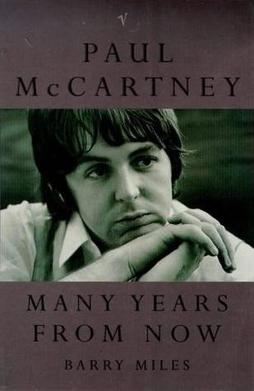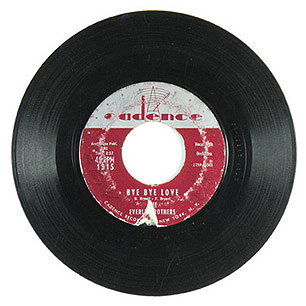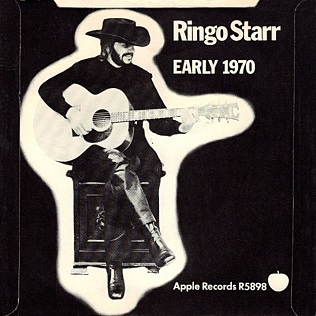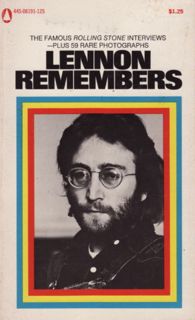
Blast from Your Past is a compilation album by English rock musician Ringo Starr, released on Apple Records in 1975. It is both Starr's first compilation LP and his final release under his contract with EMI. It was also the last album to be released on the Beatles' Apple label until it was revived in the 1990s.

"The Fool on the Hill" is a song by the English rock band the Beatles from their 1967 EP and album Magical Mystery Tour. It was written and sung by Paul McCartney and credited to the Lennon–McCartney partnership. The lyrics describe the titular "fool", a solitary figure who is not understood by others, but is actually wise. McCartney said the idea for the song was inspired by the Dutch design collective the Fool, who derived their name from the tarot card of the same name, and possibly by Maharishi Mahesh Yogi.

From August 1962 to September 1969, the Beatles consisted of John Lennon, Paul McCartney, George Harrison and Ringo Starr. Their break-up is attributed to numerous factors, including: the strain of the Beatlemania phenomenon, the 1967 death of manager Brian Epstein, bandmates' resentment of McCartney's perceived domineering, Lennon's heroin use and his relationship with Yoko Ono, Harrison's increasingly prolific songwriting, the floundering of Apple Corps, the Get Back project, and managerial disputes.

The Best of George Harrison is a 1976 compilation album by English musician George Harrison, released following the expiration of his EMI-affiliated Apple Records contract. Uniquely among all of the four Beatles' solo releases, apart from posthumous compilations, it mixes a selection of the artist's songs recorded with the Beatles on one side, and later hits recorded under his own name on the other.
Nicholas Schaffner was an American non-fiction author, journalist, and singer-songwriter.
"I'm the Greatest" is a song written by English musician John Lennon that was released as the opening track of the 1973 album Ringo by Ringo Starr. With Starr, Lennon and George Harrison appearing on the track, it marks the only time that three former Beatles recorded together between the band's break-up in 1970 and Lennon's death in 1980. Lennon wrote the song in December 1970 as a wry comment on his rise to fame, and later tailored the lyrics for Starr to sing. Named after one of Muhammad Ali's catchphrases, the song partly evokes the stage-show concept of the Beatles' 1967 album Sgt. Pepper's Lonely Hearts Club Band.

Paul McCartney: Many Years from Now is a 1997 biography of Paul McCartney by Barry Miles. It is the "official" biography of McCartney and was written "based on hundreds of hours of exclusive interviews undertaken over a period of five years", according to the back cover of the 1998 paperback edition. The title is a phrase from McCartney's song "When I'm Sixty-Four", from the Beatles' 1967 album Sgt. Pepper's Lonely Hearts Club Band. The book was first published in the United Kingdom in October 1997 by Secker & Warburg.

"Give Ireland Back to the Irish" is the debut single by the British–American rock band Wings that was released in February 1972. It was written by Paul McCartney and his wife Linda in response to the events of Bloody Sunday, on 30 January that year, when British troops in Northern Ireland shot dead thirteen civil rights protestors. Keen to voice their outrage at the killings, Wings recorded the track two days later at Abbey Road Studios in London. It was the band's first song to include Northern Irish guitarist Henry McCullough.
"Sue Me, Sue You Blues" is a song written by English musician George Harrison, released on his 1973 album Living in the Material World. Harrison initially let American guitarist Jesse Ed Davis record it for the latter's Ululu album (1972), in gratitude to Davis for his participation in the Concert for Bangladesh. When writing the song, Harrison drew inspiration from the legal issues surrounding the Beatles during the early months of 1971, particularly the lawsuit that Paul McCartney initiated in an effort to dissolve the band's business partnership, Apple Corps.
"That Is All" is a song by English musician George Harrison released as the final track of his 1973 album Living in the Material World. A slow, heavily orchestrated ballad, it is one of many Harrison love songs that appear to be directed at either a woman or a deity. Harrison wrote and recorded the song during the height of his public devotion to Hinduism; on release, Rolling Stone described its lyrics as "a sort of Hindu In Paradisium".

"Bye Bye Love" is a popular song written by Felice and Boudleaux Bryant and published in 1957. It is best known in a debut recording by the Everly Brothers, issued by Cadence Records as catalog number 1315. The song reached No. 2 on the US Billboard Pop charts and No. 1 on the Cash Box Best Selling Record charts. The Everly Brothers' version also enjoyed major success as a country song, reaching No. 1 in the spring of 1957. The Everlys' "Bye Bye Love" is ranked 210th on Rolling Stone magazine's list of "The 500 Greatest Songs of All Time".
"Be Here Now" is a song by English rock musician George Harrison from his 1973 album Living in the Material World. The recording features a sparse musical arrangement and recalls Harrison's work with the Beatles during 1966–1968, through its Indian-inspired mood and use of sitar drone. Part of Harrison's inspiration for the song was the popular 1971 book Be Here Now by spiritual teacher Ram Dass – specifically, a story discussing the author's change in identity from a Western academic to a guru in the Hindu faith. Some Harrison biographers interpret "Be Here Now" as a comment from him on the public's nostalgia for the past following the Beatles' break-up.

"Early 1970" is a song by English rock musician Ringo Starr that was released as the B-side of his April 1971 single "It Don't Come Easy". A rare example of Starr's songwriting at the time, it was inspired by the break-up of the Beatles and documents his relationship with his three former bandmates. The lyrics to the verses comment in turn on Paul McCartney, John Lennon and George Harrison as individuals, and the likelihood of each of them making music with Starr again. In the final verse, Starr offers a self-deprecating picture of his musical abilities and expresses the hope that all four will play together in the future. Commentators have variously described "Early 1970" as "a rough draft of a peace treaty" and "a disarming open letter" from Starr to Lennon, McCartney and Harrison.
"Six O'Clock" is a song by English rock musician Ringo Starr from his 1973 album Ringo. It was written by Starr's former Beatles bandmate Paul McCartney and the latter's wife, Linda, who also participated in the recording of the song. It was the first time McCartney and Starr had worked together since the Beatles' break-up in 1970. Their collaboration reflected an easing of the tensions that had existed between the two musicians for much of that period.

In Concert 1972 is a double live album by sitar virtuoso Ravi Shankar and sarodiya Ali Akbar Khan, released in 1973 on Apple Records. It was recorded at the Philharmonic Hall, New York City, in October 1972, and is a noted example of the two Hindustani classical musicians' celebrated jugalbandi (duet) style of playing. With accompaniment from tabla player Alla Rakha, the performance reflects the two artists' sorrow at the recent death of their revered guru, and Khan's father, Allauddin Khan. The latter was responsible for many innovations in Indian music during the twentieth century, including the call-and-response dialogue that musicians such as Shankar, Khan and Rakha popularised among Western audiences in the 1960s.
The Material World Charitable Foundation, also known as the Material World Foundation (MWF), is a charitable organisation founded by English musician George Harrison in April 1973. Its launch coincided with the release of Harrison's album Living in the Material World and came about in reaction to the taxation issues that had hindered his 1971–72 aid project for refugees of the Bangladesh Liberation War. Harrison assigned his publishing royalties from nine of the eleven songs on Living in the Material World, including the hit single "Give Me Love ", to the foundation, in perpetuity.
Peter McCabe was an English author and music journalist, who wrote in a variety of genres. He was an editor at Rolling Stone and Oui magazine, and is the former editor-in-chief of Country Music magazine and a nationally syndicated country music columnist.
Ring O' Records was a record label founded by former Beatle Ringo Starr in 1975. The label's formation coincided with the winding down of the Beatles' Apple Records and allowed Starr to continue supporting other artists' projects while maintaining his solo career. The label was shut down in 1978, having failed to achieve commercial success with a roster of artists that included David Hentschel, Bobby Keys, Graham Bonnet and Rab Noakes. Starr himself never recorded for Ring O' Records, although, following the expiration of his contract with Apple in January 1976, he signed with Polydor, which distributed his label throughout Europe. From 1977, Ring O' was distributed in some territories by Mercury Records.

The Singles Collection 1962–1970 is a series of reissued singles by the English rock band the Beatles. It was released in Britain on 5 March 1976 by EMI, following the expiration of the Beatles' contract with the company in January, and close to six years after the band's break-up. The collection comprises all 22 of the Beatles' UK singles, which were originally issued between October 1962 and March 1970 on either the Parlophone or Apple record labels, together with a new single pairing "Yesterday" with "I Should Have Known Better".

Lennon Remembers is a 1971 book by Rolling Stone magazine co-founder and editor Jann Wenner. It consists of a lengthy interview that Wenner carried out with former Beatle John Lennon in December 1970 and which was originally serialised in Rolling Stone in its issues dated 21 January and 4 February 1971. The interview was intended to promote Lennon's primal therapy-inspired album John Lennon/Plastic Ono Band and reflects the singer's emotions and mindset after undergoing an intense course of the therapy under Arthur Janov. It also serves as a rebuttal to Paul McCartney's public announcement of the Beatles' break-up, in April 1970.











